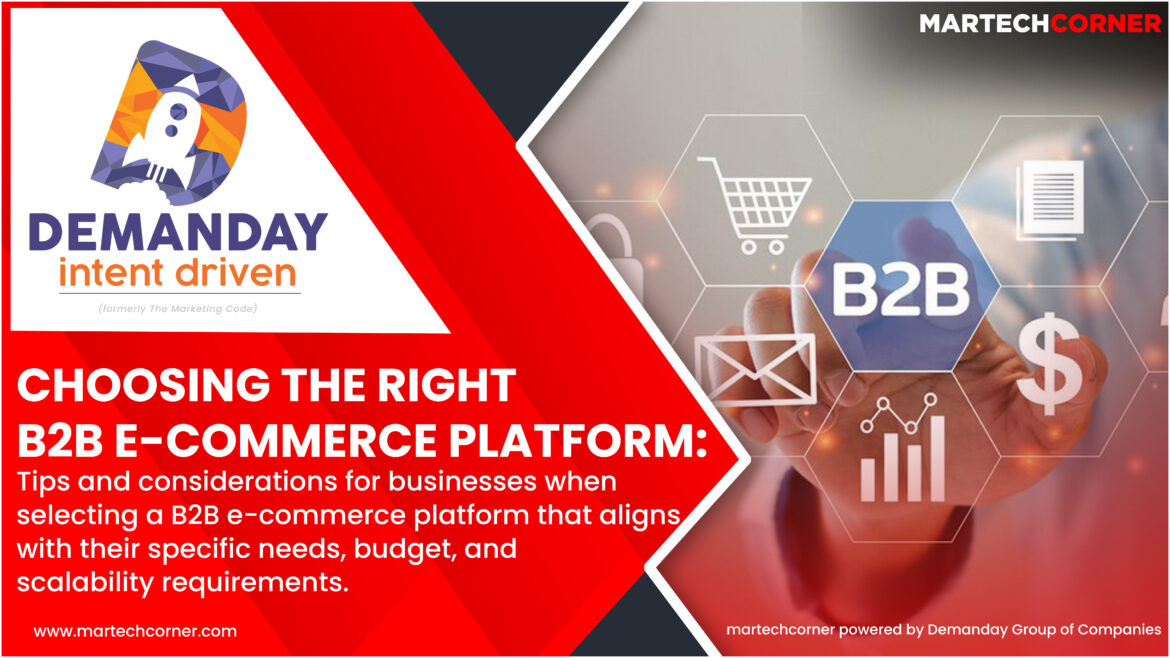Selecting the right B2B e-commerce platform is a critical decision for businesses, as it can significantly impact their online presence, customer experience, and overall success. Here are some tips and considerations to help businesses make an informed choice that aligns with their specific needs, budget, and scalability requirements:
- Understand Your Business Needs: Before evaluating platforms, thoroughly assess your specific B2B requirements. Consider factors like the number of products you offer, order volume, target market, payment and shipping options, integration with existing systems (e.g., ERP, CRM), and any other unique features essential for your business.
- Scalability and Flexibility: As your business grows, your e-commerce platform should be able to accommodate increased traffic and transaction volumes. Look for a platform that offers scalability and flexibility to adapt to changing business demands without major disruptions.
- Integration Capabilities: Ensure the platform can seamlessly integrate with your existing software and tools. This includes integration with your inventory management system, payment gateways, shipping providers, accounting software, and other relevant systems to streamline operations.
- Mobile Responsiveness: Mobile commerce is rapidly growing, and many B2B buyers use mobile devices to place orders. Choose a platform that offers a mobile-friendly or responsive design to provide a smooth user experience across various devices.
- User-Friendly Interface: A user-friendly interface is essential for both your customers and internal teams. Test the platform’s backend interface to ensure your staff can easily manage products, orders, and customer data without extensive training.
- Security and Compliance: B2B transactions often involve sensitive and confidential information. Verify that the platform follows industry-standard security protocols, offers SSL certificates, and complies with relevant data protection regulations.
- Customization Options: Every B2B business has unique requirements and branding. Look for a platform that allows for easy customization and branding, ensuring your e-commerce site reflects your company’s identity.
- Customer Support and Resources: Check the level of customer support provided by the platform. Do they offer 24/7 support? Are there online resources, documentation, or a community to help you troubleshoot issues and learn about the platform?
- Total Cost of Ownership (TCO): Beyond the initial setup cost, consider the platform’s ongoing expenses, including transaction fees, hosting costs, maintenance charges, and potential add-ons. Calculate the TCO over a few years to make an accurate cost comparison.
- Performance and Speed: A slow-loading website can lead to lost sales and dissatisfied customers. Verify that the platform has a strong track record of uptime and fast page loading speeds.
- Reviews and Recommendations: Research customer reviews and testimonials to gauge the platform’s reputation and performance. Ask for recommendations from other businesses in your industry or network.
- Future Upgrades and Updates: Understand the platform’s update process and how often they release new features and improvements. Regular updates can ensure your e-commerce site remains current and competitive.
By carefully evaluating these tips and considerations, businesses can choose a B2B e-commerce platform that meets their specific needs, fits within their budget, and provides the scalability required for future growth. Taking the time to research and make an informed decision is essential for long-term success in the ever-evolving world of B2B e-commerce.


